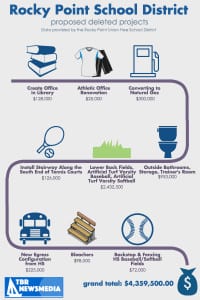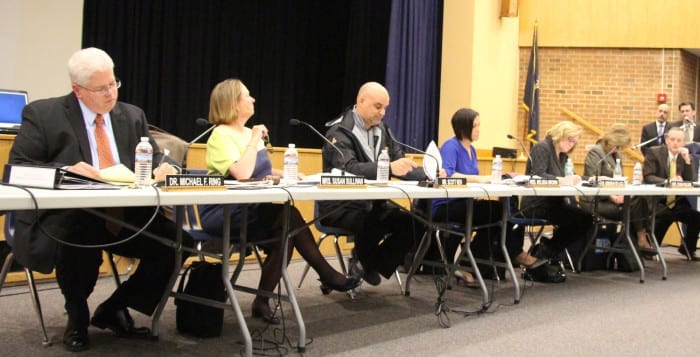Rocky Point takes second stab at bond projects proposal
After Rocky Point school district’s capital projects proposal didn’t pass last year, it was back to the drawing board.
The district presented its revised capital projects proposal on March 7, showing that while the school district is keeping many projects from its previous proposal last year, the Facilities Sub-Committee cut around $4.4 million worth of projects from the previous bond proposal.
The committee, which handles the school district’s bond proposals and revisions, got rid of extra projects like artificial turf for the varsity baseball and softball fields and outside bathrooms, among other projects. However, adding air conditioning to the Joseph A. Edgar Intermediate School and Frank J. Carasiti Elementary School cafeterias and installing another means of leaving the Middle School’s nurse’s office, were added to the $16.5 million proposal.

The board of education said the bond is subject to change, as it may add or delete projects before it goes to a vote later this year. The bond will still target repairs and renovations to the district’s facilities, which includes, but isn’t limited to, fixing the ceilings in various areas of the schools, installing light-emitting diode lights, renovating the bathrooms, repaving the asphalt and improving security.
Smaller items like fixing a crack in the Middle School’s masonry were also factored into the bond, but Rocky Point school district Superintendent Michael Ring said this was intentionally added to the capital projects proposal.
“These are unique — unlike other special projects, these could be recipients of state aid because [of] the nature of them,” Ring said. “So if voters are going to consider a bond, it would make sense to put it in there.”
For the past three or four decades, state aid has reimbursed 70.2 percent of the school district’s project costs. This takes some pressure off taxpayers and the school district to fund the project. Ring added that mandatory projects like new security cameras, will go into the school district’s 2016-17 budget if the bond doesn’t pass. If it passes, the average homeowner with an assessed value of $2,600 will pay $74.48 a year in additional taxes over a 15-year period.
According to Rocky Point resident Bruce MacArthur, community involvement is important when it comes to passing a bond.
“We have virtually no participation right now from the community,” MacArthur said during the meeting. “[The] larger issue is how do we get the community more involved to be educated on the projects that are being proposed.”
Around 20 people, including the board of education, attended Monday’s meeting. The board and the sub-committee hope to attract more people for its future bond proposal meetings to get more community input before residents vote in favor or opposition of the bond.
“We all came to a consensus that we have to try to sell it [to residents],” said board of education President Susan Sullivan. “One of the reasons we’re meeting is because we are looking to move on this.”







